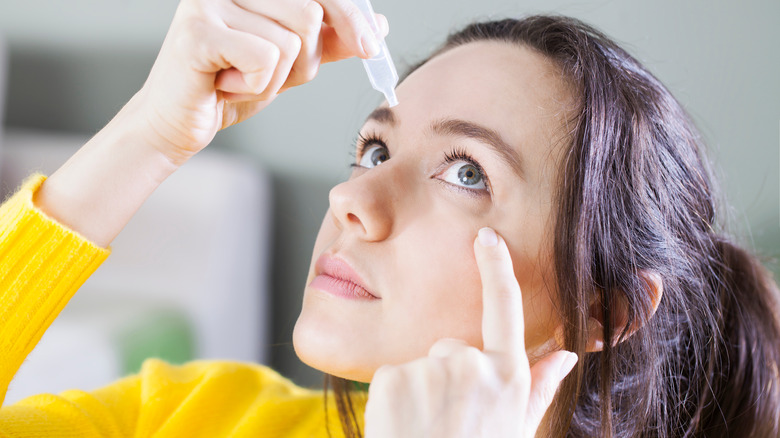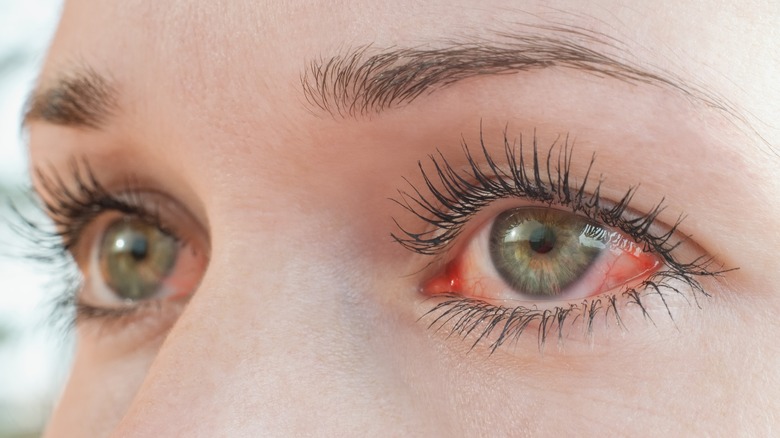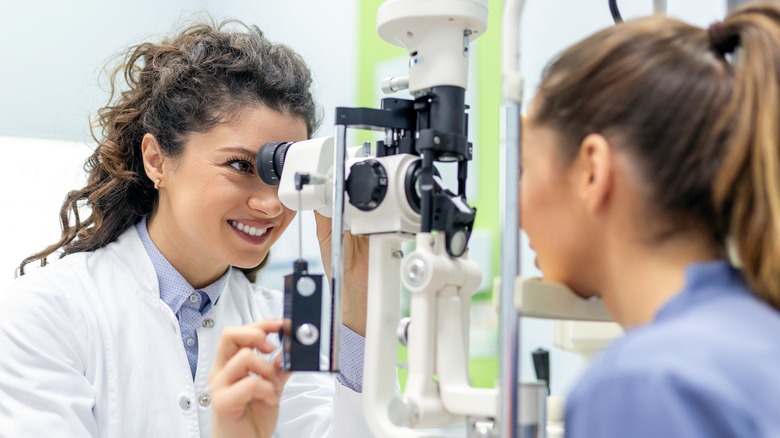The Unexpected Side Effect Of Some Whitening Eye Drops
We've all had that sinking feeling — you take a glance in the mirror in the morning after waking up only to find you have bloodshot and tired-looking eyes. This can be a knock to your confidence, especially if you have important things to do later in the day like a job interview or a first date. To avoid the embarrassment of going about your day with red eyes, you may be keen to anxiously douse yourself with whitening eye drops. Although this product promises to alleviate redness by making the sclera (the white part of the eye) appear brighter, whitening eye drops might not always be the best option.
This simple over-the-counter product with brand names like Lumify (first approved by the FDA in 2017) may not be the best treatment for eye redness. Using these products frequently has been shown to potentially cause harmful side effects. Instead, first consulting a doctor to identify the root cause of eye redness is advisable.
Let's examine the potential side effects associated with whitening eye drops and the common root causes of eye redness that may require different treatments.
What are the potential side effects?
Although whitening eye drops can help reduce redness in the short-term, over time, they may actually cause more harm than good. In her "Ask an Eye Doc" YouTube series, VSP Vision Care network optometrist Dr. Christine Joy explains, "Many of these drops contain the active ingredient tetrahydrozoline, which can actually make your eyes more red with consistent use."
Tetrahydrozoline aims to reduce the size of swollen blood vessels in your eyes, thereby reducing redness. Nevertheless, temporary use is advisable. "There's a real rebound effect, and your eyes can become even redder than they ever would have been," Amy Lin, MD told the University of Utah. Many whitening eye drops also contain potentially harmful preservatives in the form of benzalkonium chloride that, over time, might damage the eye. "If you're using Lumify four times a day, you're putting a lot of preservative in your eye," Laurie Barber, MD, a spokesperson for the American Academy of Ophthalmology said.
According to Lumify's own clinical trials, the drops can occasionally cause other minor side effects, such as itching, tearing, and pain.
Whitening eye drops may not be the solution
Many medical eye practitioners agree that whitening eye drops can only provide a short-term solution to eye redness. So, what should you do instead?
According to the National Eye Institute, common underlying causes of eye redness include dryness, allergies, conjunctivitis and severed blood vessels. While some of these conditions are easily treatable, others may be a sign of something more serious. Therefore, it's important to get to the bottom of the problem. "We don't want patients to use eye drops that mask symptoms of their disease," warned Dr. Louis Barber speaking to the American Academy of Ophthalmology. "If there is something wrong with the eye, we need to know about it. A person should get evaluated for red eyes before using eye drops on a regular basis."
Overall, while it may be tempting to grab the whitening eye drops next time you suffer from redness, it's always better to solve the problem for good rather than use a quick-fix solution — especially when that solution can sometimes come with unwanted side effects!


